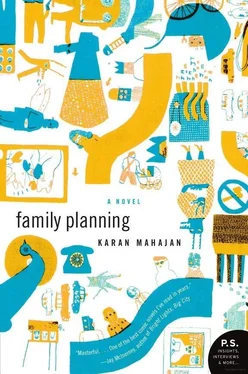This is the most awful thing I have done to a woman, he thought. I hope I am never forgiven for it.
He never hit her again. He whispered into her ear, “Now tell me.”
“She forced me to wear her clothes and come to the tent. She is a very difficult woman. How can I explain it to you? How?” She was whimpering more than talking.
“Who is she?” he whispered gruffly. “Don’t use pronouns.”
“My mother, ji: She is not wanting any of us to get married. Yes, there are people like that in the world also. She wants all of us to grow old in her company. To be with her always. She is a hypochondriac and is always sick. She wants us all to take care of her till she passes away. But she will never die. A person as sick as her never dies.”
She sat up and frizzed up her hair in what was a surprisingly mannish manner; fingers forking through from the front of the scalp to the back.
“For me, who am oldest and not so attractive, she always tried to find a boy who was too good-looking. This meant that no boy said yes to me. I got used to this. I thought I would not get married ever. But Asha, my sister—”
“Yes,” Rakesh snapped. “I know her. I know she is your sister. I was supposed to marry her. Perhaps you remember?”
She ignored this. “Asha is very pretty. On her side, Mummy thinks no boy is good enough. For five years, we have been looking. Then you came. We were all so impressed by your picture. You are so fair. You have such a good height. You have fine shoulders. We all liked the way you part your hair on the side and the way you had grown your sideburns like a film star. You also have a very nice set of eyes. They are not quite brown.
“So Asha said yes. But then what always happens happened. Mummy started poisoning Asha’s mind. She started saying she had talked to her astrologer and he said the stars were bad. That you were a widower and you would always miss your first wife. That it was very strange that your parents were so sick that they could not even meet us.” (That was the excuse Rakesh had used to justify their absence.)
“Then ten days ago, Mummy almost phoned your house and said no. That was when I got very angry. We started shouting at each other. And I said, just as a thing to say, Fine, if Asha will not marry him, then I will .
“That was it. Then she forced me, ji. I had just said it as a thing to say only. And she forced me. She forced me to wear Asha’s clothes and marry you.”
“But you don’t look the type to get forced.”
She shrugged her shoulders. “I know what my mother thought. She thought you would expose me and bring disgrace upon the family. And then no one would ever want to marry me or Asha or Raghav. Raghav is my good brother.”
“So why did you do it?”
“I was forced.”
Again she began to bite her nails, but Rakesh grabbed her hand from her mouth and held her thick fingers tight. “You don’t look like the type to get forced. Admit it. You wanted it also. You are making this up. You wanted it also. You secretly wished this would happen. That I wouldn’t expose you. You’re happy right now. You’ve taken revenge on your family, on your mother. Admit it — you’re happy.”
When Rakesh looked back days later, it was apparent he had been speaking for himself. This girl — this girl lying naked next to him — was pure revenge on his parents’ expectations. This is why he got the stupid idea into his mind that he should stay with her, that he should make love to her. She wasn’t timid. She was ugly, assertive. Marrying this woman would be a true announcement of his individuality, a statement that he owed nothing to anyone, least of all his parents. He could only imagine the look on his parents’ faces when they asked him tomorrow— Is this the same girl you saw? We thought she was slimmer? What happened to her face?
Fatness, Mummy! Fatness happened!
All his rebellions before this had been false, Rakesh realized. He did things his way but always with the subconscious goal of pleasing his parents. He had picked Asha for his second marriage himself, but she was exactly what his parents would have wanted: pretty, from the right caste, no threat to his mother in terms of sophistication. He had only hid her from them because she was so perfect.
And no one could have been more perfect than Rashmi.
His mind jetted back to his time in America. The fireside cozy of their suburban home, the two cars in the front drive ready to be ignited. Frost. How Montpelier, Vermont, smelled in the fall, like a freezing blade held up to your nose. And under the tantrum of red leaves, your feet on frostbitten gravel. How you clustered together for warmth, the big hug, the small family.
Rakesh, Rashmi, and Arjun.
He opened his eyes in shock at the image, the sensual clearness of it.
He hadn’t missed America at all till now. Only during his first trip back to India, when he was fresh from the snow-suckled locales of Vermont, had he compared India to America — that, too, subconsciously. Rakesh liked to think of himself as an educated populist— give me a wet armpit, and I’ll give you a B.A.-pass nose to smell it! — but he was also a man whose self-consciousness in America had led to an obsession with smells. Before parties, while Rashmi draped herself in Kanjeevarams, he would perfume his armpits — a blind man would have been forgiven for mistaking those pits for hairy potpourri. Once, the white particles of his solid deodorant had rained down his arms when he gesticulated wildly. “This is not dandruff!” he had explained to shocked Americans. “This is deodoruff!”
Those soapy-smelling Americans accepted him and laughed away at his lame jokes — only Rashmi would lash out at him with her tragic eyes. He would panic at those moments, forget the punchline, flail, and sink further into party-joke ignominy. He only wanted, after all, to impress his wife; he loved her so much. So, when she died, and he peered into an endless future without her, he wondered: What would he do at gatherings, at parties without Rashmi?
With whom would he go home and laugh at the foolish naïveté of these friendly Americans?
One famous question which they had spent all night laughing about, a pillow squeezed tight between them, was this: If you don’t mind my asking, I’ve never been to India, so forgive me, I may be thinking of the wrong animal, but, Mrs. Ahuja, is it common for people to own elephants the way people here own horses?
And Rashmi had said to the old lady: Why, of course, how else would I get to the airport?
When he and Arjun were taking the plane back to India for Rashmi’s cremation, that was the one line that appeared to sum up America for him.
He hated America so much. He hated it for taking Rashmi away from him, plus U.S. Air had just served him a pancake with a little packet of liquid on the side that looked exactly like maple syrup but was actually soy sauce, and soy sauce plus pancake was the perfect recipe for midair barf — he hated America so much that his mind exploded the one inane sentence Do you own an elephant? into a plan to scoff America for a lifetime. He would dedicate his life henceforth to owning an elephant in his Delhi house and riding it shamelessly through Khan Market, GK Market, South Extension, Paranthe Kee Gulley — really, whatever direction the wind blew the creature’s Dumbo ears. In addition, Rakesh would dress purely in saffron, never shower, and make it a point to emit a terrific odor. He would allow his elephant to mold mountains of shit wherever it desired so that curious American tourists could follow in his wake and photograph that Far Eastern shit ! If he was invited to a party, he would say: “Only if you invite my elephant and refuse to bring it up in conversation at any point. Because if you bring it up then it will suggest to Americans that elephants are indeed unusual in an urban Indian setting, and this will break their hearts. So what would you rather do? Maintain an icy silence — or send Americans screaming, heartbroken?” At restaurants he would throw a consumerist fit if the patron said: “Do you want a doggy bag, sir?” Do I look like a doggy-owning sort of man to you! Are these the hands of a doggy-rider? At night he would let the elephant rest in his driveway and scrub it like a lovesick mechanic and refer to it as PINKY. But mostly Rakesh relished the image of walking up to his parents and saying I am dedicating myself to buying an elephant and enjoying their stunned expressions.
Читать дальше












